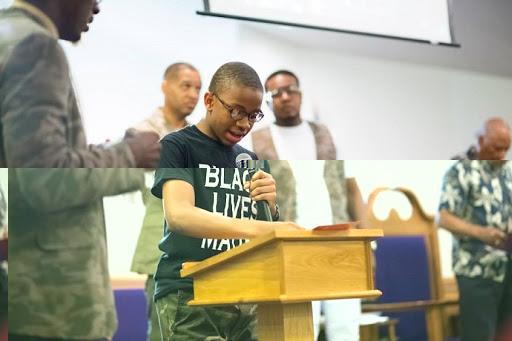(ThyBlackMan.com) In a dynamic society that has become more tolerant of sin, young believers are constantly faced with challenging life decisions. Homosexuality, gender identification, and pre-marital sex were once considered taboo topics on Sunday mornings, now they are mainstream and accepted as the norm. Consequently, many young believers are facing various identity issues because churches have remained relatively hush on these topics. Accordingly, many young believers are left to tread these difficult waters without the benefit of biblical guidance.
Because churches have not openly addressed these issues, many young people see the Church as irrelevant and out of touch. How does one reconcile these concerns with the word of God? Has it become too challenging for young believers to maintain their identity in Christ? Has the Church lost touch with the needs of young believers by failing to create safe environments for them to express their issues? Is the Church condemning young believers for issues that it has failed to address or prepare them for? This article strives to address these questions, identify some of the hindrances and lastly, offer recommendations for ministry leaders who are struggling in these areas.
The church is charged with the responsibility of creating a non-threatening, open, and accepting atmosphere where people are safe to pursue their identity. It is a fact that many churches promote an atmosphere of religious legalism, defined as an exhausting and discouraging routine of do’s and don’ts, without helping congregants to understand the love and grace of God.

Since the beginning of the church, previous generations dealt with homosexuality, gender identification, and pre-marital sex. Yes, some of us “seasoned saints” have forgotten that we too struggled with the same issues young believers are facing today. Admittedly, previous generations lacked understanding, compassion, and acceptance. Therefore, over time young believers began seeking their identity in other things, such as other religions, humanism which rejects the spiritual and stresses self-realization through reason and self-deification which is the idolization and worship of self.
The church has not sufficiently prepared young people, through the teachings of the word of God and more importantly through modeling of the word of God. Moreover, once young people approach the church for spiritual healing and assistance, they are shunned, negatively labeled, and condemned. For those who were turned away, the church is viewed as hypocritical, insecure, and uncompassionate.
The church, to a certain extent, failed to teach and prepare them for the challenges of the world. Fighting Satan and resisting temptation requires preparation, training, and skill. The church is responsible for equipping young believers with the knowledge to wage spiritual warfare. This is a battle that one cannot, nor should not fight alone.
Young believers in Jesus the Christ require additional love and encouragement from older, more mature believers, not judgement. Many young people have received “battle scars” and deep emotional wounds inflicted by experimenting with the sins of the world. To effectively reach the youth of today, mature, loving, and compassionate Christians must teach the biblical love and the truth of Jesus Christ that is relevant to today’s issues. Youth must feel safe, in a biblical, loving environment, to openly discuss and share their issues of racial discrimination, homosexuality, gender identification, and pre-marital sex. Regrettably, many of these acts are commonly accepted as today’s norms.
The Bible reminds believers in Jesus Christ to bear one another’s burdens and model Christ-like compassion for those who are caught in a sinful pattern of life or lifestyle. Paul articulates this concept by stating, “Brothers, if someone is caught in a trespass, you who are spiritual should restore him with a spirit of gentleness. But watch yourself, or you also may be tempted. Carry one another’s burdens, and in this way you will fulfill the law” (Galatians 6:1-2). Bearing others’ burdens is the supreme imitation of Jesus, the ultimate burden bearer.
“Iron sharpens iron, and one man sharpens another” (Proverbs 27:17). As believers, a youth’s interaction with a Godly person both encourages corrects and hones one’s skill in handling life’s trials and valleys. Jesus has called believers to uplift, encourage, and remind one another, that although we still sin, we are no longer slaves to sin and death. We are “more than conquers though Him who loved us” (Romans 8:37). Let us be unequivocally clear, we all need accountability partners to help us from making poor decisions that are contrary to the word of God. One might ask the question, “Am I my brother’s keeper?” The answer is a loud and resounding, “Yes.”
Recommendations
Church leaders must become active listeners and give the youth a platform to express their concerns. Reinvest in youth through small group programs to include mentorship which focuses on their specific issues and concerns. Institute youth bible studies with youth leadership at the forefront. Conduct questionnaires to determine relevant topics and allow young people to assist with the prioritization and the development the curriculum. Churches that lack the resources to provide these services, should establish partnerships with other churches to consolidate resources and talent.
To reclaim our youth, religious traditions, pride, and legalism should not hinder the progress of the Church. Now is the time for the Church to create a loving and compassionate atmosphere to guide them in Christian principles. We say to the Church as Jesus stated to the disciples, “Let the little children come to me, and do not hinder them, for the kingdom of God belongs to such as these (Mark 10:14).
Written by Rev. Dr. Larry E. Thompson, Rev. Dr. James A. Cobb, Rev Henry L. “Charlie” Sanders Jr, and Deacon Glenn Davis

















Leave a Reply